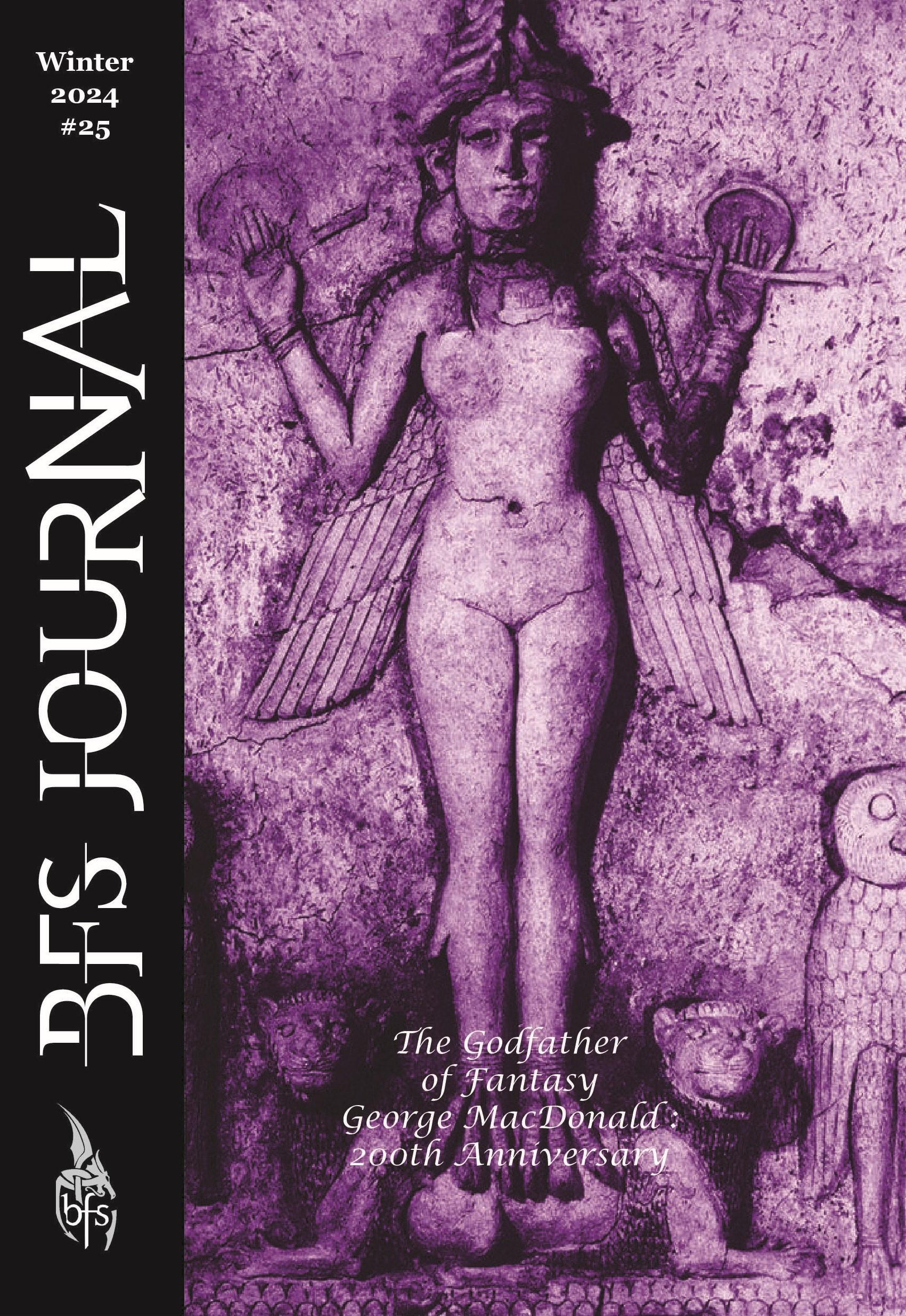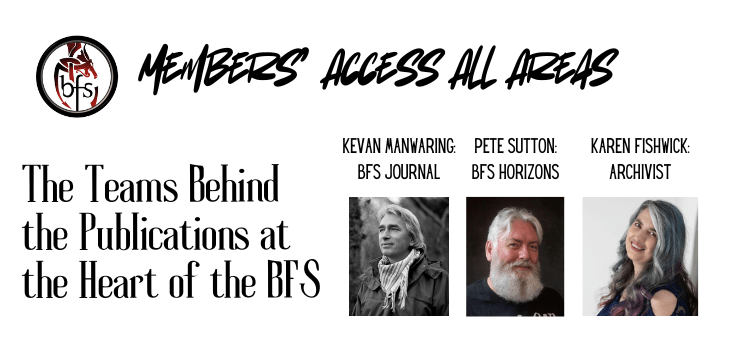To help us get the year started right, we’re highlighting some of the amazing work done by our BFS volunteers and the great opportunities our members can seize. Today, we chat with the editors of BFS Horizons and the BFS Journal, and hear from our official Archivist.
Every few months, gorgeous little doses of wonder end up in the inbox or mailbox of BFS members around the world. These publications—the fiction and poetry of BFS Horizons, and the non-fiction and academia of the BFS Journal—are the lifeblood of the Society, just as similar past publications have drawn people to the Society in its various incarnations for over half a century.
We asked each publication’s editors to tell us more about their work on the publications, what goes on behind the scenes, and whether there’s more we, as members, can do to support them. Here’s what they said.
To get involved with any of our publications, head to our volunteering page and submit your details.
BFS Horizons: Editor, Pete Sutton

Editor Pete Sutton is assisted by Poetry Editor Ian Hunter and Art Editor Jenni Coutts, and a host of slush readers and submitters from around the world. Together they are the team behind BFS Horizons.Â
Why did you get involved in BFS publications?
I got involved because I had been editing a magazine that had folded, and I missed it and when I saw that a new editor was needed I threw my hat in the ring. It’s been a wild ride so far – not least because of changes in my personal life that have meant juggling this responsibility has sometimes been challenging. But I still enjoy it. Having in your hand a finished copy of something that has been woven together out of many people’s imagination into a coherent whole is what it’s all about.
What goes on behind the scenes to push out these publications regularly?
Define regularly! (I’ve been pretty poor at that sadly – hope springs eternal that things will improve). We get hundreds of stories submitted and the amount has grown year on year since I’ve been editor. We also get poems and art – ably handled by our poetry and art editors. We are rapidly approaching half a million words worth of stories to consider for Issue 19! This takes quite some time to sift through. I ask that there are at least two sets of eyes (2 different slush readers) on each story with only those recommended by the readers coming to me to judge for acceptance. Which means I no longer read everything submitted, although I did when I first became editor!
Once stories are chosen and contributors sign a contract and accept their edit, the assistant editor creates a running order with help from the editor-in-chief (me), the art editor (Jenni) and the poetry editor (Ian) – all the finals of art, story and poetry with the running order are then given to the typesetters (Liz and Becky) who create a final of the magazine in print ready and ebook formats. These are then proofread and the finished files uploaded to the publishing platform and given to the printer to distribute to our paper members. Once the magazines have been published they are orderable from online and physical stores.Â
BFS Horizons recently became a paying market, so we also ask contributors to invoice the Society. Part of the editor’s job is getting the treasurer to get his credit card out and pay our contributors.
(Pictured top: Ian Hunter; bottom: Jenni Coutts)

When I took over as editor the Society was smaller, we didn’t pay contributors, and there was less reach than now; the exec who took over under Shona and Juliet have worked wonders and we now get a great many more submissions. This makes the voluntary role more than I could handle by myself, hence recruiting slush readers, assistant editors, proofreaders, typesetters, and an art editor. But inevitably we have slowed down and now struggle to produce the two issues per year we’d like to do.

Are there opportunities for members to get involved beyond submitting?
We are always open to anyone offering to help, from slush reading to proofreading. Recently we’ve had an offer of translation for a story (watch out for that in Issue 19) so if you speak and regularly read in a foreign language we’re open to that too (obviously you’d need to get the author to agree!). We’d dearly love an in-house cartoonist too (if you’re interested. contact the art editor).
Anyone who reads short stories can volunteer to read the slush pile – which never seems to shrink! Since opening to pay contributors we have been inundated with quality work and it’s hard to sift through the many submissions; it’s certainly more than one person can handle and our assistant editor (Robin CM Duncan) does an amazing job collecting the slush in one place and organising the readers we already have. If you can read and if you have an opinion on what makes a story good or bad then you’ve got the skills necessary! As mentioned above we could also do with proofreaders which is a bit more of a specialised skill.
BFS Journal, Dr Kevan Manwaring
Kevan took the helm of the BFS Journal last year and his first issue, the Winter focus on George McDonald, was sent out in December.Â
Why did you get involved in BFS publications?
I have been a lifetime fan of Fantastika (Fantasy; Science Fiction; Weird, etc). I love writing it (e.g. my Epic Fantasy series, The Windsmith Elegy), and these days it is my main research interest as an academic, so an opportunity to edit the Journal feels like a golden ticket to the chocolate factory.

I get to work with some fabulous writers and fellow enthusiasts, and showcase their excellent work. I feel it is important to provide a platform for Fantasy scholarship in the UK and encourage critical perspectives, which deepen our appreciation of the genre/s, and introduce new readers to classic and contemporary authors.

What goes on behind the scenes to push out these publications regularly?
A huge amount of unpaid work – drafting calls for submissions and posting in relevant places; fielding enquiries; corresponding with regular and special contributors; editing; design; preparing for print; proof stage; planning launch events; promoting launch events; hosting launch events, etc.
Are there opportunities for members to get involved beyond submitting?
We are always looking for reviews, original artwork, and letters to the editor. Perhaps helping to promote it at BFS events. As it grows, more peer reviewers would be good – send a bio with experience/publications to me.
And finally, a note from the Archivist, Karen Fishwick
When the Society started in 1971, it didn’t have many of the things we love about it today, no Fantasycon until 1975, no other BFS events until London Open nights started in 1985 (the AGM was held at other peoples Science Fiction events) and obviously no Internet activities.Â

What it had were 2 publications; The Bulletin, which was published into the 80’s before its ater re-emergence in its digital form, and Dark Horizons which was published until 2010. These were the backbone of the new Society allowing communication in the form of news, reviews and letters to the editors as well as sharing fiction, art and poetry. In the early days, this is what shaped our community.Â
Over time these evolved into a variety different publications, both one offs and longer series. Longer titles included; Masters of Fantasy 1981 – 1987, The British Fantasy Newsletter, which became Prism 1982 – 2005, (Winter) Chills 1987 -1996, Mistique 1989 – 1995, Bookshelf 1991 – 1995, New Horizons 2008 – 2010, The Journal 2010 – present and Horizons 2015 – present.
If you have back copies of publications that you would like to re-home in the BFS archive, please contact me via archivist@BritishFantasySociety.orgÂ

